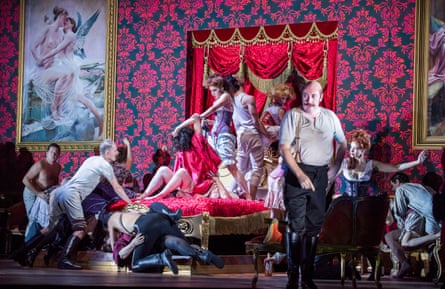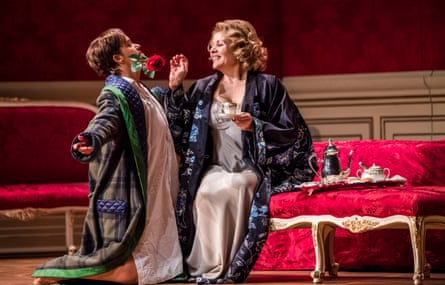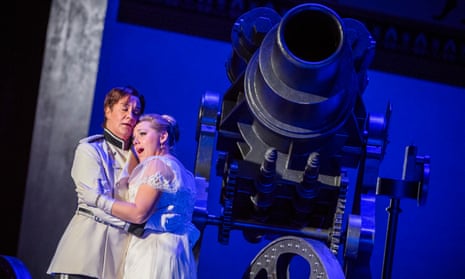Before the first night of the Royal Opera’s new production of Der Rosenkavalier, much was made of the fact that it updated the action of Strauss and Hofmannsthal’s rococo comedy to the time of its composition in 1911. In the event Robert Carsen’s staging proves to be the least involving element of the evening, providing more irritations than insights; what one takes away is the quality of most of the individual performances and, after a slightly uncertain start, of the superb orchestral playing under Andris Nelsons.
In fact, the production, which is bound for the Metropolitan Opera in New York in the spring, is not all new. It’s a reworked version, with Paul Steinberg as the designer this time, of what Carsen did for the Salzburg festival in 2004. That version was tailored to the vast expanse of the stage of the Grosses Festspielhaus, and the deadening monumentality about the look of it all persists, especially in the second act. Faninal (Jochen Schmeckenbecker), who becomes an arms dealer already grown rich on the preparations for war, has Alice Coote’s Octavian make the presentation of the silver rose to Sophie (Sophie Bevan) in front of a crowd of his gun-toting cronies, in a dining room decorated with a militaristic Hellenic frieze and two massive field guns.

If that signals a Europe hell-bent on conflict then relocating the third act to a brothel for the humiliation of Baron Ochs is presumably intended to point up the decadence and decay that was invading Viennese society, and which the over-the-top sumptuousness of the Marschallin’s palace in the first act was still managing to keep at bay. That’s all fine as far as it goes, but does little to illuminate what the opera is actually about, which is a wry take on growing up and growing older, set at a time when class conventions and pretensions defined the parameters of how such things should be managed. Carsen offers little on that, except to play down the comedy and introduce some distractions – having dancing couples waltzing away behind Octavian and Sophie during their duet in the second act, one of the score’s truly rapturous moments, for instance, is unforgivable.

There are enough chances, though, for the singers to transcend their dramatic packaging to make it worthwhile. One of the purposes of the show is to create a vehicle in London and New York for Renée Fleming as the Marschallin, and though her performance seemed at first diminished by the surroundings, it grew in authority through the first act – her “Stop the clocks” monologue was truly touching, and her singing in the great trio at the end of the third act had all the gilded smoothness one could want, if not always enough attention to each word and what it means. Coote’s rather gauche Octavian settled down as the evening went on too, while Bevan’s Sophie was seraphic from the start, if a little less innocent and vulnerable than she might have been.
Matthew Rose’s Ochs, though, is the real star turn, sung almost elegantly, and managing to make a real person, if not at all a likable one, out of a character that is normally hammed up as a caricature. Genuinely funny moments are thinly scattered in this production but Rose’s timing is always a delight, and his flouncing departure after his third-act dismissal by the Marschallin was a real tour de force, with Nelsons extracting tremendous excitement out of the orchestra, just as he had conjured playing of gossamer fineness from it earlier in the same act.
- In rep at the Royal Opera House, London, until 24 January. Box office: 020-7304 4000. The opera will be broadcast live on on Radio 3 on 14 January.

Comments (…)
Sign in or create your Guardian account to join the discussion